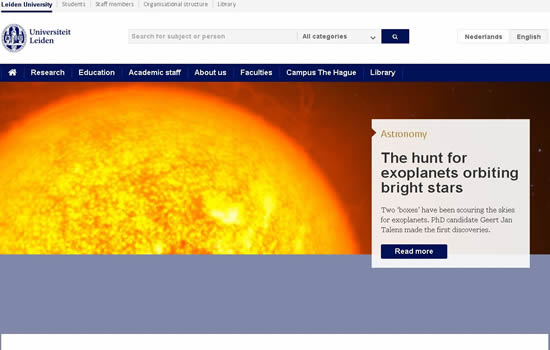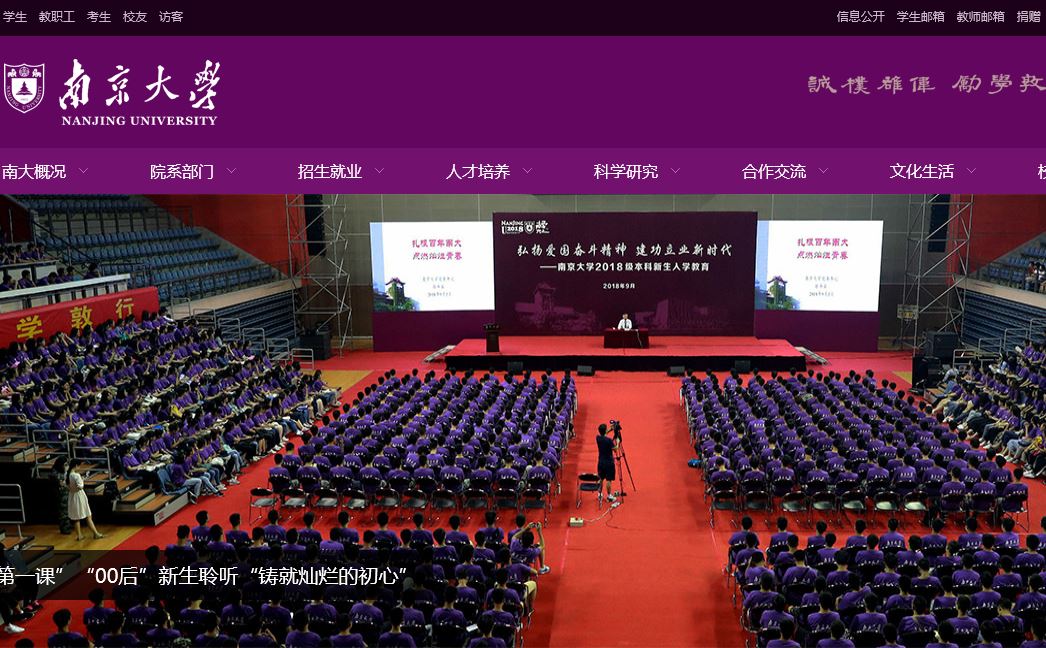选择热点
 荷兰莱顿大学
荷兰莱顿大学 西班牙巴塞罗那大学
西班牙巴塞罗那大学 巴西圣保罗大学 University of Sao Paulo, Brazil
巴西圣保罗大学 University of Sao Paulo, Brazil 台湾南华大学 University of South China in Taiwan
台湾南华大学 University of South China in Taiwan 科技大学 National University of Defense Technology
科技大学 National University of Defense Technology 南京大学 Nanjing University
南京大学 Nanjing University 上海复旦大学 Fudan University
上海复旦大学 Fudan University 泗水大学(Ubaya)
泗水大学(Ubaya) 印尼大学 universitas indonesia
印尼大学 universitas indonesia 越南某大学 Vietnam National University
越南某大学 Vietnam National University 菲律宾大学 University Of The Philippines
菲律宾大学 University Of The Philippines
as, when,while的用法区别详解
发布时间:2025-01-06
来源:大学网站
as, when,while的用法区别详解三者都有“当……时候”的意思,注意以下用法与区别:1.
若主句表示的是一个短暂性的动作,而从句表示的是一个持续性动作时,三者都可用。
如:He fell asleep when [while, as] he was reading.
他看书时睡着了。
I met him when [as, while] I was taking a walk in the park.
我在公园散步时遇到了他。
注:as 用于引出一个持续性动词表示“在……期间”时,其谓语通常只能是那些含有动作(action)和发展(development) 意味的动词,一般不能是那些不用于进行时态的动词(如 be, seem, love, want, agree, see, know, have 等),所以下面一句中的 while 不能换为 as:A:I’m going to the post office.
我要去邮局(
。
B:While you are there, can you get me some stamps?
当你在邮局时,能帮我买几张邮票吗?
2.
若主、从句表示两个同时进行的持续性动作,且强调主句表示的动作延续到从句所指的整个时间,通常要用 while。
如:Don’t talk while you’re eating.
吃饭时不要说话。
I kept silent while he was writing.
在他写的时候,我默不作声。
但是,若主、从句表示的两个同时进行的动作含有“一边……一边”之意思,通常要用 as。
如:She sang as she went along.
她边走边唱(
。
3.
若从句是一个短暂性动作,而主句是一个持续性动作,可以用 as 或 when 但不用 while。
如:When [As] he came in, I was listening to the radio.
他进来时,我在听收音机。
It was raining hard when [as] we arrived.
我们到达时正下着大雨。
4.
若主、从句表示的是两个同时(或几乎同时)发生的短暂性动作,一般要用 as (也可用 when)。
如:I thought of it just when [as] you opened your mouth.
就在你要说的时候,我也想到了。
5.
若要表示两个正在发展变化的情况,相当于汉语的“随着”,一般用 as。
如:Things are getting better and better as time goes on.
随着时间的推移,情况越来越好。
As it grew darker, it became colder.
天色越晚,天气越冷。
6.
表示“每当……的时候”(暗示一种规律性),一般要用 when。
如:It’s cold when it snows.
下雪时天冷(
。
He smiles when you praise him.
你夸奖他时他总是笑笑。
7.
若主、从句所表示的动作不是同时发生,而是有先后顺序时,一般要用 when。
如:I will go home when he comes back.
他回来时,我就回家去。
I will discuss this with you when we meet next time.
我们下次见面时,我要同你讨论这个问题。
【as, when,while的用法区别详解查看网站:[db:时间]】
若主句表示的是一个短暂性的动作,而从句表示的是一个持续性动作时,三者都可用。
如:He fell asleep when [while, as] he was reading.
他看书时睡着了。
I met him when [as, while] I was taking a walk in the park.
我在公园散步时遇到了他。
注:as 用于引出一个持续性动词表示“在……期间”时,其谓语通常只能是那些含有动作(action)和发展(development) 意味的动词,一般不能是那些不用于进行时态的动词(如 be, seem, love, want, agree, see, know, have 等),所以下面一句中的 while 不能换为 as:A:I’m going to the post office.
我要去邮局(
。
B:While you are there, can you get me some stamps?
当你在邮局时,能帮我买几张邮票吗?
2.
若主、从句表示两个同时进行的持续性动作,且强调主句表示的动作延续到从句所指的整个时间,通常要用 while。
如:Don’t talk while you’re eating.
吃饭时不要说话。
I kept silent while he was writing.
在他写的时候,我默不作声。
但是,若主、从句表示的两个同时进行的动作含有“一边……一边”之意思,通常要用 as。
如:She sang as she went along.
她边走边唱(
。
3.
若从句是一个短暂性动作,而主句是一个持续性动作,可以用 as 或 when 但不用 while。
如:When [As] he came in, I was listening to the radio.
他进来时,我在听收音机。
It was raining hard when [as] we arrived.
我们到达时正下着大雨。
4.
若主、从句表示的是两个同时(或几乎同时)发生的短暂性动作,一般要用 as (也可用 when)。
如:I thought of it just when [as] you opened your mouth.
就在你要说的时候,我也想到了。
5.
若要表示两个正在发展变化的情况,相当于汉语的“随着”,一般用 as。
如:Things are getting better and better as time goes on.
随着时间的推移,情况越来越好。
As it grew darker, it became colder.
天色越晚,天气越冷。
6.
表示“每当……的时候”(暗示一种规律性),一般要用 when。
如:It’s cold when it snows.
下雪时天冷(
。
He smiles when you praise him.
你夸奖他时他总是笑笑。
7.
若主、从句所表示的动作不是同时发生,而是有先后顺序时,一般要用 when。
如:I will go home when he comes back.
他回来时,我就回家去。
I will discuss this with you when we meet next time.
我们下次见面时,我要同你讨论这个问题。
【as, when,while的用法区别详解查看网站:[db:时间]】
- 上一篇: first 与 at first的用法区别
- 下一篇: 介词 about, on, with用法辨异
相关阅读
目录列表
资讯列表
英语资讯


共0条评论
网友评论温馨提示:您的评论需要经过审核才能显示,请文明发言!